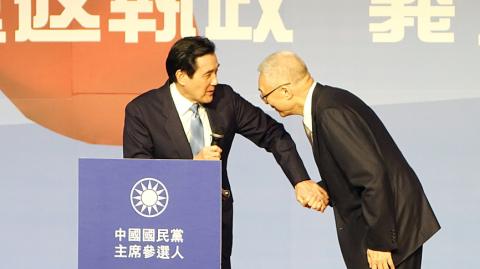Former president Ma Ying-jeou (馬英九) yesterday hurled insults at KMT Chairwoman Hung Hsiu-chu’s (洪秀柱) team and cross-strait policy platform at a solidarity rally held for Chinese Nationalist Party (KMT) chairperson candidate Wu Den-yih’s (吳敦義) campaign.
Ma took aim at a recent controversy, when it was revealed that “dummy members,” had been signed to the party en masse, saying that the practice “used to be the Democratic Progressive Party’s trick, not the KMT’s.”
Addressing accusations that members with organized crime backgrounds joined the party, Ma said the reports have had a terrible effect on the party, and such “pests” must be eradicated for the KMT to regain its “sunshine image.”

Photo: George Tsorng, Taipei Times
The KMT has “a clear understanding of right and wrong, upholds morality and takes its connections with party members seriously, characteristics that have arisen from the party’s 100-year history,” he said.
“However, there are some party comrades that have been ranting at their own brethren; there are even reports alleging that certain party members plan to launch a political vendetta against me, accusing me of being to blame for devastating the party and the nation,” Ma said.
One of the “comrades” Ma was referring to is understood to be KMT Central Policy Committee director Alex Tsai (蔡正元), who has been involved in a series of heated spats and exchanges with Ma’s office, the most recent regarding Ma’s acknowledgment that Chiang Kai-shek (蔣介石) should be held accountable for the 228 Incident.
Tsai responded that then-Taiwan governor Chen Yi (陳儀), who ordered police and military action against protesters, was less corrupt than Ma.
The vendetta that Ma mentioned is believed to relate to forums organized by Chang Ya-chung (張亞中), a close aide of Hung’s and the principal of the “Sun Yat-sen School” set up by Hung.
The school, launched at the beginning of this month, was said to be “for the appraisal of past KMT leaders and their achievements and misdeeds.”
The school evaluated former presidents Chiang Kai-shek on March 2, Chiang Ching-kuo (蔣經國) on March 9 and Lee Teng-hui (李登輝) on Thursday.
Ma is scheduled to be discussed on Thursday next week.
Ma also repeated that the so-called “1992” consensus has benefited Taiwan greatly and was “not a ‘consensus’ between the KMT and the Chinese Communist Party, but one reached, under the direction of former president Lee Teng-hui, between Taiwan’s Mainland Affairs Council and China’s Association for Relations Across the Taiwan Straits.”
“One China, different interpretations” has garnered a high level of support, he said, adding that it should not be “arbitrarily overlooked, revised or abolished.”
“It should not be changed to [Hung’s] ‘one China, same interpretation,’ which has left many of our supporters disconcerted,” Ma said.
The “1992 consensus” refers to a supposed understanding reached during the cross-strait talks in 1992 that both Taiwan and China acknowledge that there is “one China,” with each side having its own interpretation of what that means.
In 2006 former Mainland Affairs Council minister Su Chi (蘇起) admitted he made up the term in 2000, before the KMT handed power to the Democratic Progressive Party.

The brilliant blue waters, thick foliage and bucolic atmosphere on this seemingly idyllic archipelago deep in the Pacific Ocean belie the key role it now plays in a titanic geopolitical struggle. Palau is again on the front line as China, and the US and its allies prepare their forces in an intensifying contest for control over the Asia-Pacific region. The democratic nation of just 17,000 people hosts US-controlled airstrips and soon-to-be-completed radar installations that the US military describes as “critical” to monitoring vast swathes of water and airspace. It is also a key piece of the second island chain, a string of

A magnitude 5.9 earthquake that struck about 33km off the coast of Hualien City was the "main shock" in a series of quakes in the area, with aftershocks expected over the next three days, the Central Weather Administration (CWA) said yesterday. Prior to the magnitude 5.9 quake shaking most of Taiwan at 6:53pm yesterday, six other earthquakes stronger than a magnitude of 4, starting with a magnitude 5.5 quake at 6:09pm, occurred in the area. CWA Seismological Center Director Wu Chien-fu (吳健富) confirmed that the quakes were all part of the same series and that the magnitude 5.5 temblor was

The Central Weather Administration has issued a heat alert for southeastern Taiwan, warning of temperatures as high as 36°C today, while alerting some coastal areas of strong winds later in the day. Kaohsiung’s Neimen District (內門) and Pingtung County’s Neipu Township (內埔) are under an orange heat alert, which warns of temperatures as high as 36°C for three consecutive days, the CWA said, citing southwest winds. The heat would also extend to Tainan’s Nansi (楠西) and Yujing (玉井) districts, as well as Pingtung’s Gaoshu (高樹), Yanpu (鹽埔) and Majia (瑪家) townships, it said, forecasting highs of up to 36°C in those areas

Taiwan will now have four additional national holidays after the Legislative Yuan passed an amendment today, which also made Labor Day a national holiday for all sectors. The Chinese Nationalist Party (KMT) and Taiwan People’s Party (TPP) used their majority in the Legislative Yuan to pass the amendment to the Act on Implementing Memorial Days and State Holidays (紀念日及節日實施辦法), which the parties jointly proposed, in its third and final reading today. The legislature passed the bill to amend the act, which is currently enforced administratively, raising it to the legal level. The new legislation recognizes Confucius’ birthday on Sept. 28, the